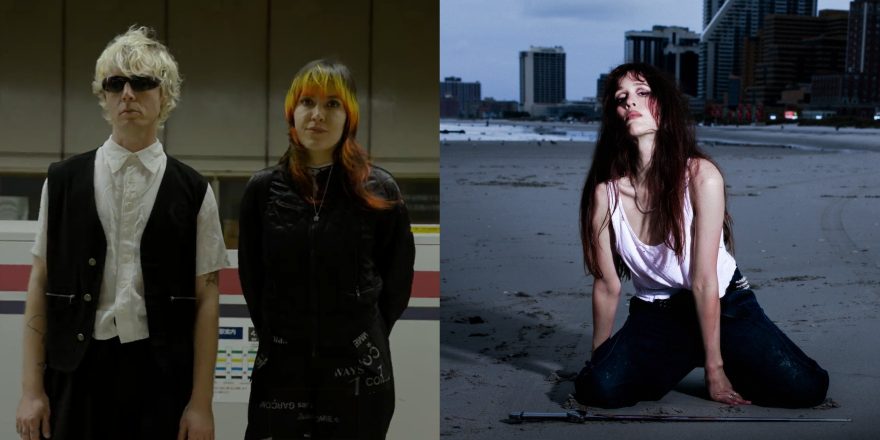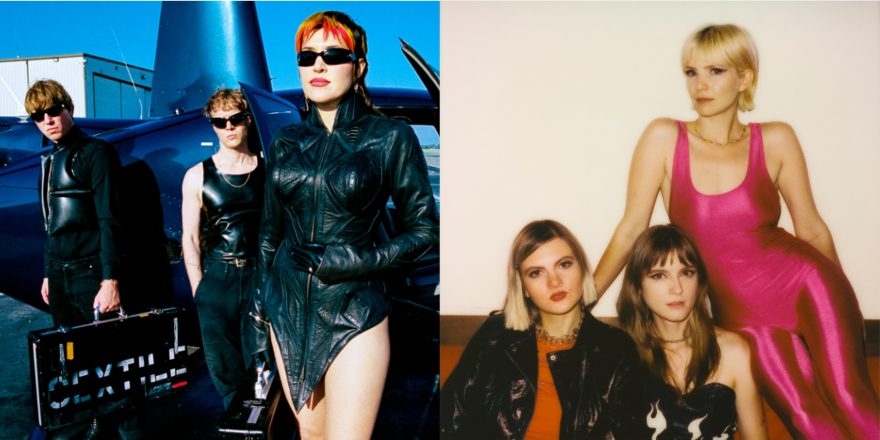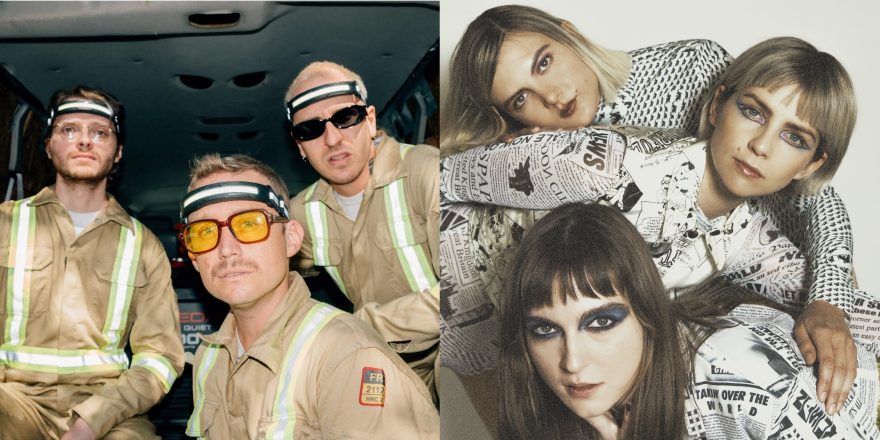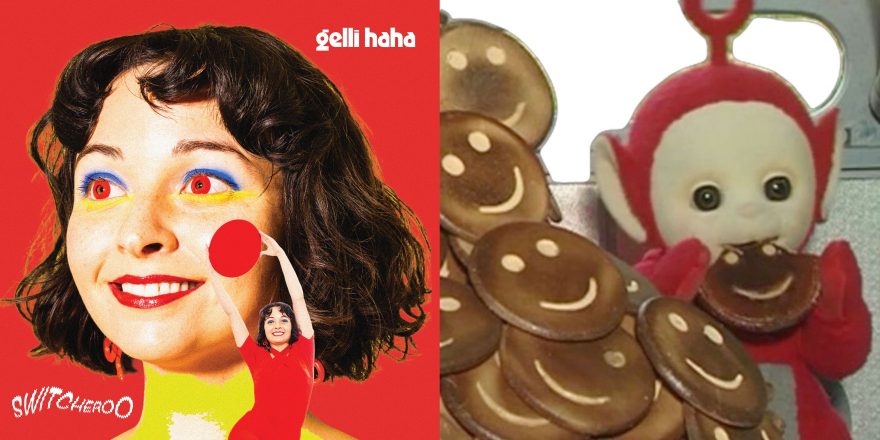Melissa Scaduto and Brady Keehn are the founding members of the LA-based electronic-punk duo Sextile; Marie Davidson is an electronic musician, producer, and DJ from Montreal, whose latest record, City of Clowns, was released this spring on DEEWEE. Sextile’s new record, yes, please. just came out in May, so to celebrate, the artists got on the phone to catch up about it all.
— Annie Fell, Editor-in-chief, Talkhouse Music
Melissa Scaduto: So, Marie, what are you doing in New York?
Marie Davidson: I am now in Montreal, but I was playing a show at Knockdown Center.
Melissa: Oh, I saw footage from it! It looked fucking sick.
Marie: Yeah, it was really cool.
Melissa: I saw a footage of a train conductor stopping and honking.
Marie: Three train drivers stopped and honked, but there’s this one guy at the end — the two first just honked and drove by, but the last stopped his train and kind of got out of the cabin and was raving. [Laughs.] He was so cool.
Brady Keehn: That’s so awesome.
Melissa: That’s why I miss New York, shit like that. Random people, they’re down to have a good time.
Brady: Melissa was born in New York, in Queens.
Marie: That’s true, you are from New York! Are you both from New York?
Brady: No, I’m from Virginia.
Marie: OK. Where did you meet? In LA?
Brady: No, New York. We started the band in Los Angeles, but we were making music, just kind of fucking around in New York and not really taking it too seriously.
Melissa: We were just total fuck ups at the time, drinking and doing a lot of drugs and… not focused on bringing joy to the world at all. [Laughs.]
Marie: [Laughs.] I understand.
Melissa: Yeah. It’s kind of a miracle that we’ve changed that completely.
Marie: I find it really impressive that you managed to turn yourself around like that and make this big comeback, and you’re sober. I have a lot of respect for your journey.
Brady: Aw, thanks.
Melissa: I was just reading today — I didn’t realize you didn’t play shows or anything for, like, a year-and-a-half?
Marie: I myself struggle with addiction, too. Other kinds — I had an eating disorder, which is an addiction to control. It’s the same as heroin or nicotine. It took me years and years and years to kick it. It’s a mental illness. And because of that addiction, I got into other addictions. Mine was sleeping pills and downers. But I managed to get out of it, and now I use sleeping pills, but only when I tour, and I don’t have at all the need to take it when I’m home. It took me years, but I relearned how to naturally sleep, which was impossible for me for many years, and that’s when I went a little bit psycho.
When I did the break, it was part of that, but also just my relationship with social media post-pandemic was really bad. I disliked how as a musician it became so important, like the main thing, and it really threw me off. I didn’t know how to navigate that new cycle of things with being online and having pressure from the industry to create online content. Because I was always just a person who works with sound and words, and never with image.
Brady: A hundred percent.
Marie: I was really a not image-driven person. I was really conflicted, so I took a whole year off. I found my way back through DJing, actually. The pleasure of being with the music kind of brought me back. And I’m much healthier now. I did therapy and worked on myself.
Melissa: Yeah. Going back to what you said before, I really struggle right now with sleep, especially on tour. It really sucks. It makes it really difficult to function without sleep.
Marie: For me, it’s the hardest part.
Brady: Yeah. A couple things there: we hate social media and doing it as well. As a matter of fact, we had to hire somebody recently.
Marie: That’s smart. That’s the way to go.
Brady: It’s been so nice.
Melissa: They send us shit before they post it.
Marie: To review it?
Melissa: You have to. Because sometimes it doesn’t feel like our personality. But they’ve come up with some cool ideas, and honestly, it’s easier because obviously I don’t think any of us started making music because we thought about how to promote ourselves.
Marie: No, no, no. The three people talking here are definitely not people who were thinking of presentation and image. We all come from a background of, like, partying and playing in bands.
Brady: Yeah, exactly. Wait, so you had a falling out with music over the pandemic?
Marie: Right before the pandemic, I started making music with a band, with Pierre [Guerineau] and another guy called Asaël [R. Robitaille] from Montreal. They were like my band; we were Marie Davidson & l’Œil Nu. I actually really liked working with these guys in the studio. The studio part was really nice, to be around with people, to have sessions three times a week. And we would go late, we would work all day, all night. We had a really close bond. And then the pandemic hit as we were completing the record, so we were a pandemic cell, the three of us just being together making music. And when we released the record, it was hard because everything was about online presence, because there were no shows. And towards the end of the cycle of that album, we did a few shows in Quebec and Canada, and we had this one tour in Europe — only one short tour, and it was the end of the pandemic, so it was still a bit weird. It was nice to play these shows, but I just had a moment where I felt very drained. I guess it was because I had been doing it for too long. And the social media stuff, like the video capturing and picture posting, was really throwing me off. I was a bit lost. I took some steps back, stopped the band, broke up with management.
Melissa: Wow.
Marie: Yeah. I wasn’t even on social media for, like, eight months.
Brady: So how do you eventually get out of it?
Marie: Through DJing. I started DJing for fun, with no intentions of doing it as a career, and I really liked it. It brought me back to the essential thing, which is music.
Brady: I was asking because I had a very similar falling out with music during the pandemic, where I stopped believing in it and had a very similar outlook on social media. I was like, “Are we doing this to make art? Are we doing this for money? Is this a machine that I’m stepping into, or am I going to keep making music for art’s sake?”
Melissa: It just became very nihilistic.
Marie: I think it’s good to recognize these things and reposition yourself like you did. You did take a step back, and you definitely have come back very strong. From what I’m seeing from the outside, your comeback is really strong, but it feels very genuine. You own your image. You own your music.
Brady: Thank you. You do too! No doubt.
Marie: Yeah, of course. It’s really important for me. I would never let it in the hands of anyone. That was the nice thing with working with DEEWEE, the Belgian label, because Dave and Steph [Dewaele] — who own the label, and they are also Soulwax — they are friends. I’m working with friends.
Melissa: How did you meet them?
Marie: We met through a mutual friend in 2017. I didn’t even know who they were, but we became friends because we got well along. They’re funny guys. I like their sense of humor. And we stayed in touch very minorly, and then when I released Working Class Woman, they liked “Work It” and they offered to do a remix. And it’s the remix that really took off. The remix was nominated at the GRAMMYs in 2020.
Brady: What!
Marie: Yeah, it didn’t win, but…
Brady: Congratulations, though. That’s so sick.
Marie: It was still cool. So when I was working on City of Clowns [with Pierre Guerineau], I hit them up at some point to see if DEEWEE would be interested in releasing the record. But I did not know that if you’re on DEEWEE, you have to be in Ghent and working with them in their studio. All the records that are on DEEWEE have been mixed on the DEEWEE board. That turned out as a surprise, but it was really nice because in the end, it made it more special because they were like, “You’re going to come here and we’re going to work together,” which made a much stronger bond. They are the label, but they’re also co-producers on the record.
Melissa: Those guys really love music. They’ve done so many iconic remixes, but I feel like they actually remix deep cuts, and they seem to remix projects that they believe in, not just because it’s big or whatever the fuck.
Marie: Oh no, not at all. They have this clout where they’ve been around for a long time and now I feel like they do only projects that they like.
Melissa: Yeah, my buddy saw them DJ in New York not that long ago, and he texted me that they were playing some of our music. I was just flattered that they even had heard it, honestly.
Marie: They have such a deep collection. They know what’s up. To be around at DEEWEE, you’re surrounded by new records all the time.
Melissa: I had a question for you when I was listening to the record, and then I was like, Oh, I wonder if Marie’s already answered this question. You know how it is with interviews, people keep asking you the same shit. But when I heard “Sexy Clown,” I was like, Man, I wonder if this is about being a performer.
Marie: It is, yeah.
Melissa: Because the words spoke to me in the same sense. I’ve felt like that performing before.
Marie: That makes me happy because it’s really about being a woman entertainer. So if it spoke to you, it means I’m doing something right. It means that my message is coming across.
Melissa: Yeah, before I even looked up the lyrics, what I could understand I was just like, Shit. I’ve never even heard it defined as “sexy clown” before, but I have literally felt like a fucking sexy clown.
Marie: You are!
Melissa: [Laughs.]
Marie: Both of you.
Brady: No, I’m just a clown.
Marie: No, let me tell you — I decide who’s a sexy clown.
Brady: [Laughs.] OK, OK.
Marie: But I think we also have this joker energy. I think we know we are very serious with our music, but we’re not too serious about the way we approach being out there.
Brady: Yeah. Or about life.
Marie: Yeah. Maybe we’ve all been through a lot. And once you go through the highs and the lows of having a career in music and nightlife, you don’t take yourself so seriously. But you also don’t take other people seriously so much. Like if someone gives me attitude in a backstage situation, I’m just like, “OK, yeah, I see you. Your ego, I feel it.” But seriously, we’ve been through so much. I cannot take this seriously. I cannot let this affect me too much, because life goes on, you know?
Brady: A hundred percent. It’s such silly bullshit.
Melissa: This is really true for the sound — before we had a front of house, we would play shows and I would kiss the ass of every grumpy-ass front of house person just so they would not mix us like shit. But the amount of fucking ego… It was often musicians that just didn’t make it and they were pissed to be mixing.
Marie: Oh, yeah. You want to know something very funny? One of my best friends is studying sound and light engineering right now, and she’s also a musician, and she told me that in one of her classes, that’s how the teacher introduced himself. He said, “Let’s be honest, a lot of us here are failed musicians.” I was like, “Wow, that’s bitter.” I don’t think it’s true. Even if you’re not doing music as a career, first, it doesn’t mean you’re a failed musician.
Brady: No.
Marie: And secondly, that’s your problem. If you think you are a failed musician and you want to put it upon other people, that is your fucking problem.
Melissa: Yeah. I mean, you could really make music anytime. I feel like that band Sleaford Mods is a really good example of that — I think their first record was put out when they were both already in their 50s.
Marie: That’s cool.
Brady: Yeah, and then you still make it around the world and tour around the world and influence people when you do that. There is no timing.
Marie: I don’t believe in general ageism.
Melissa: It’s definitely an old idea. Honestly, I think Gen Z is kind of cooler about ageism than our generation was.
Marie: That’s right. I think it’s changing progressively. I hope.
Brady: Have you ever ghost written for anybody?
Marie: No, I don’t. That’s something I’ll never do because I cannot let my music go. I’m too attached to what I do. Even if it doesn’t have a commercial value, or even if it’s just a tiny idea, like a melodic sequence or something, I just can’t. There’s this new Miley Cyrus song, and they sample “Work It,” but just the intro, the synth. We said yes, but initially they had my lyrics being sung by another person. And I was like, “No.” And they were like, “OK, but what if—” And I was like, “No. You don’t use any of my fucking lyrics.” I thought it was so cringe. I just couldn’t let it go. I would never ghostwrite because even if I’m not the greatest singer and another singer could sing much better than me. I just don’t want my ideas to be sung by someone else.
Melissa: Yeah, I understand that.
Marie: I’m not interested in selling my ideas.
Brady: Yeah.
Melissa: We had this artist who ripped off “Disco.” The drums and the bass line are almost exact. It’s kind of fucked up. And she admitted that she did, but it’s not like we got anything for it. But we have mutual friends, so we were like, “She should have just asked us to write for her.” But then she did, and we sent her a song where it’s my voice on it and my lyrics, but we actually wanted her to come up with something new over the song, not do what I did. But then she responded being like, “I love it, can I get your lyrics?” And I told Brady, “I actually don’t think I can do this.”
Marie: You were not able to let it go.
Melissa: Yeah. I just also realized I didn’t really believe in her work, and she already ripped us off, so I was like, “Why would we do this?” I’d rather have featured singers on our album.
Marie: Or be a feature singer. That’s the thing for me. It’s the same — I don’t mind working with bigger or smaller artists than me. It doesn’t matter for me the size. But it needs to be a collaborative thing. I don’t want to sell my ideas. It’s like, “If you want me, I’m on the track or I’m not at all.”
Melissa: Yeah. I mean, some people are like, “You should have taken these opportunities.” Because we had multiple people hit us up in the last year asking us to write for them, and they’re all pop stars. But I don’t like any of their music or their image or any of the shit they promote. So I was just like, “Why would we do this?”
Marie: There’s no point for me. The amount of money you’ll get will never pay back your self-esteem. Also, you are a good act — you’re active, you have clout. Keep your energy for you. That’s also what I say to people when people ask me that: I intend on doing more records, so I gotta keep my juice for myself.
Melissa: Right, yeah.
Marie: Working with Pierre, Dave, and Stephen on my record — yes, I needed other people for that, and it elevated the music that was already there. But we don’t need other people’s fame to justify our career. I only work with bigger artists if I’m part of the program.
Brady: That makes complete sense.
Melissa: Yeah, otherwise you compromise a lot of your ideals.
Marie: In a way, everything is transactional in life. But I need to get something out of the transaction, too. Not just money — satisfaction value. I feel I need to be valued as an artist. Not just get some royalties on the side and be tossed aside.
Brady: Well, thank you so much for taking the time.
Marie: It’s an honor. We should hang next time. Have a good night, and have a great show tomorrow!
Melissa: Oh, thank you!
(Photo Credit: right, Nadine Fraczkowski)







